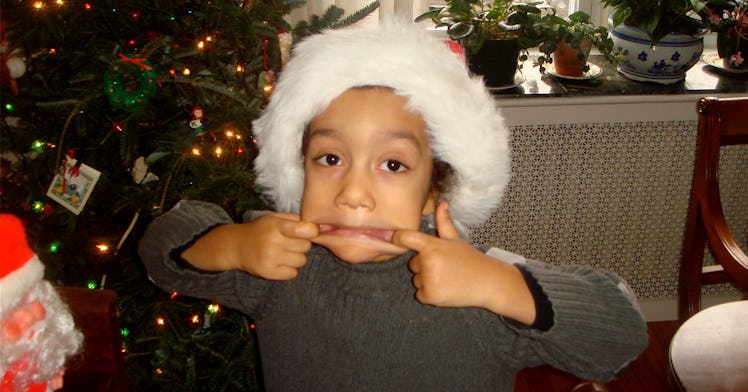Do Children Who Believe In Santa Behave Better?
The threat of a lump of coal didn't work on us, and it doesn't work on kids today. Here's why.

Young children who believe in Santa may behave marginally better temporarily for the sake of the season compared to children who don’t, but that’s not a reason for parents to worry about them growing up. When kids eventually stop believing in Santa, if they were already good kids that’s not going to change. However, if they already struggled with behavioral problems, a naughty and nice list won’t change much either, clinical child psychologist Paul DePompo told Fatherly.
But that’s not to say the threat of coal can’t nip one or two tantrums in the bud. “Believing in Santa can work for a young child’s behavior in the short-term in specific circumstances,” DePompo says.
The study of Santa remains woefully inadequate. Last year, Harvard researchers took a humorous stab at determining whether Santa delivers presents to good children more than bad children, and published their surprisingly rigorous findings in the holiday edition of BMJ. (They also found that Santa visited pretty much everyone equally—except for poor kids. Terrible PR for Christmas 2016). More serious approaches to Santa have found that the entire story of a jolly man who gives presents to good kids is “a largely undesirable myth inspired by parents seeking to fulfill their own infantile needs.” Harsh.
But more recently, scientists have been tackling the question of how belief in Santa affects children. One scathing study in The Lancet Psychiatry found that believing in Santa could result in psychological damage once children discover that (spoiler alert) their parents have been lying to them. Still, some experts suspect it doesn’t really matter whether kids believe in Santa or not. They’ll turn out just fine.
As far as how belief in Santa affects a child’s behavior, however, the data is clear—it basically doesn’t. DePompo says this is because even short-term behavioral gains from the promise of presents depends on how parents positively reinforce good behavior year round. If you’re scolding bad behavior more than you’re praising good behavior, then the idea that Santa might not bring your kids their toys doesn’t make a difference. Conversely, if you’re encouraging what they do right more than coming down on what they do wrong (DePompo recommends a ratio of five to one), then the Santa myth could help grease the wheels.
“When a parent is already consistent in their discipline and positive praise for things like listening, talking nicely, being calm, a parent will often have enough credibility with their child where the child will believe the consequences of bad behavior,” DePompo says. In other words, the threat of a mythical man not showing up for kids who misbehave is just another “consequence”. If when parents promise consequences they deliver, then fear Santa can be as much as deterrent as the specter of time-out. But if parents promise punishment and consistently fail to deliver, “better not shout, better not cry” will fall on deaf ears.
Even then, it’s more beneficial to focus on the positive, DePompo says. Instead of threatening what Santa won’t do if your kids don’t clean up their room, try focusing on what he will do if they do their chores.
Nonetheless, DePompo cautions that even effective Santa-teasing (focusing on the positives; being consistent) is unlikely to have long-term benefits for kids’ behaviors—because Christmas only comes once per year and, in mid-July, children aren’t so concerned about Santa’s list. “A child does not hold things in their memory for too long,” he says. “So this is something that will not likely work year round”
This article was originally published on